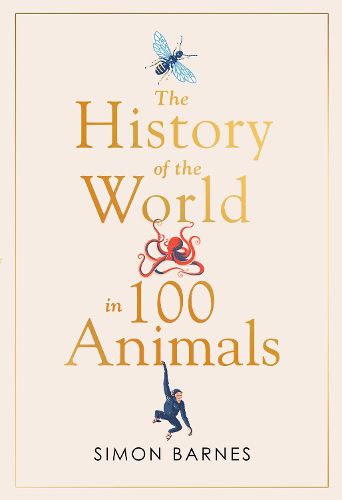Readings Newsletter
Become a Readings Member to make your shopping experience even easier.
Sign in or sign up for free!
You’re not far away from qualifying for FREE standard shipping within Australia
You’ve qualified for FREE standard shipping within Australia
The cart is loading…






‘So, so good! … More gems than a pirate’s chest … science, art, history, culture - it’s epic and mammoth, a repository of all our truths through their lives’ Chris Packham A powerful and fascinating insight into the 100 animals - from the blue whale to the mosquito - that have had the biggest influence on humanity through the ages.
We are not alone. We are not alone on the planet. We are not alone in the countryside. We are not alone in cities. We are not alone in our homes. We are humans and we love the idea of our uniqueness. But the fact is that we humans are as much members of the animal kingdom as the cats and dogs we surround ourselves with, the cows and the fish we eat, and the bees who pollinate so many of our food-plants.
In The History of the World in 100 Animals, award-winning author Simon Barnes selects the 100 animals who have had the greatest impact on humanity and on whom humanity has had the greatest effect. He shows how we have domesticated animals for food and for transport, and how animals powered agriculture, making civilisation possible. A species of flea came close to destroying human civilisation in Europe, while the slaughter of a species of bovines was used to create one civilisation and destroy another. He explains how pigeons made possible the biggest single breakthrough in the history of human thought. In short, he charts the close relationship between humans and animals, finding examples from around the planet that bring the story of life on earth vividly to life, with great insight and understanding.
The heresy of human uniqueness has led us across the millennia along the path of destruction. This book, beautifully illustrated throughout, helps us to understand our place in the world better, so that we might do a better job of looking after it. That might save the polar bears, the modern emblem of impending loss and destruction. It might even save ourselves.
$9.00 standard shipping within Australia
FREE standard shipping within Australia for orders over $100.00
Express & International shipping calculated at checkout
‘So, so good! … More gems than a pirate’s chest … science, art, history, culture - it’s epic and mammoth, a repository of all our truths through their lives’ Chris Packham A powerful and fascinating insight into the 100 animals - from the blue whale to the mosquito - that have had the biggest influence on humanity through the ages.
We are not alone. We are not alone on the planet. We are not alone in the countryside. We are not alone in cities. We are not alone in our homes. We are humans and we love the idea of our uniqueness. But the fact is that we humans are as much members of the animal kingdom as the cats and dogs we surround ourselves with, the cows and the fish we eat, and the bees who pollinate so many of our food-plants.
In The History of the World in 100 Animals, award-winning author Simon Barnes selects the 100 animals who have had the greatest impact on humanity and on whom humanity has had the greatest effect. He shows how we have domesticated animals for food and for transport, and how animals powered agriculture, making civilisation possible. A species of flea came close to destroying human civilisation in Europe, while the slaughter of a species of bovines was used to create one civilisation and destroy another. He explains how pigeons made possible the biggest single breakthrough in the history of human thought. In short, he charts the close relationship between humans and animals, finding examples from around the planet that bring the story of life on earth vividly to life, with great insight and understanding.
The heresy of human uniqueness has led us across the millennia along the path of destruction. This book, beautifully illustrated throughout, helps us to understand our place in the world better, so that we might do a better job of looking after it. That might save the polar bears, the modern emblem of impending loss and destruction. It might even save ourselves.